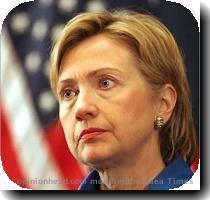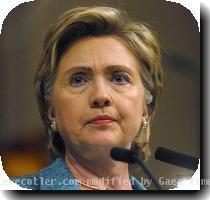Despite economic development, Angola still virtual one-party state
By Donna Bryson, APMonday, January 18, 2010
After 4 decades of war, Angola tries to recover
LUANDA, Angola — During a visit in August, U.S. Secretary of State Hillary Clinton publicly urged the government of Angola to hold “timely” presidential elections.
Just four months later, President Eduardo dos Santos announced that presidential elections would be delayed from 2009 to at least 2012.
The move was hardly surprising in Angola, which is seeing considerable economic development but is still ruled by the longest-serving president in sub-Saharan Africa. After four decades of war, peace and a building boom are visibly changing its capital, Luanda. However, even Angola’s friends, let alone its critics, acknowledge it is still a virtual one-party state plagued by corruption and propped up by U.S., European and Chinese oil companies.
U.S. Ambassador Dan Mozena said it was not his place to pronounce on the presidential vote.
“They have their elections when they have their elections,” Mozena said. “They build the democracy they build.”
Angolan government and party officials did not respond to requests for interviews. Dos Santos, who has been in power since 1979, is known for his reluctance to speak to the press, and many top aides follow his lead.
That reluctance to engage is one of the reasons Cesaltina Abreu describes dos Santos’ government as a dictatorship, or even a nascent monarchy — referring to rumors dos Santos is grooming a son to succeed him.
“I don’t see any development without democracy,” said Abreu, an independent Angolan development worker and rights activist.
In fact, while democracy lags far behind, the development in Luanda is hard to miss. Dozens of cranes tower over construction sites. Among other projects, new stadiums were built in Luanda and three other cities for a continentwide football tournament in January.
Instead of showing the world how far Angola has come, the tournament underlined the country’s volatility. On Jan. 8, two days before the African Cup of Nations kicked off, suspected separatists in the country’s far north ambushed a bus carrying Togolese football players. A coach and team spokesman and the driver were killed. The tournament went on without Togo.
Down a narrow dirt lane in Luanda’s crowded Flamingo quarter, Chinese laborers renovating a government military museum finish work for the day, their faces shaded by wide-brimmed straw hats as they stroll past Angolans on the streets. Ricardo Gazel, senior economist in Angola for the World Bank, said the government has “tried to do a lot in a short period,” so has had to bring in foreigners with skills Angolans lack.
The money comes from oil, of which Angola is a major supplier to the U.S. In 2007, oil revenues came to an estimated $44 billion, 72 percent of GDP. While Angola is a more stable source of oil than Nigeria, human rights groups have accused the military of atrocities in Cabinda, the main oil-producing region.
But the money from oil and the current development are not evenly spread. Half of Angola’s 16 million people live without access to clean water, and a third of adults remain illiterate.
The name of the slum in Angola’s capital, Boa Vista, means beautiful view. But all Domingos Katarina can see from her Boa Vista home is other shacks below, and goats picking through the garbage along a cliff wall above.
Katarina, a 43-year-old soldier’s widow, said the new roads and hotels being built elsewhere in Luanda mean “things can change for the better. For sure.”
They haven’t yet.
In Boa Vista’s crazy quilt of shacks — some fashioned from cinder blocks, others from sheets of metal and even abandoned car parts — Katarina has transformed the yard of her one-room home into a lunch counter. Water comes from a tap across a busy street. Electricity lines loop from poles to shack roofs, but power supply is unpredictable.
“I work alone and I have to support my family,” said Katarina, who has nine children ranging in age from 5 to 20, and can afford to send none to school. “It’s difficult for me to talk about democracy. I have no time to think about it.”
Angola is now determined to diversify after the global recession brought home the folly of dependence on oil, according to ambassador Mozena. With an international recession sending oil prices plummeting, Angola suspended payments owed to construction companies and cut government spending.
Mozena, who grew up on an Iowa farm, sees potential in Angola’s 35 million hectares of arable land, only 5 percent of which is now being used. Before independence from Portugal, Angola exported not only cotton, but corn, coffee, sugar, rice and bananas. It now imports most of what its people eat.
But it will take time to reconstruct agriculture regions — and the roads and rail tracks to get seeds, fertilizers and people in and exports out. The road is being repaired from Catete to Luanda, where Angola’s main port is located.
Government officials “have been trying to create conditions for the diversification of the economy. However, there is a lot to be done,” said Ricardo Gazel, senior economist in Angola for the World Bank.
Things are slowly improving for 78-year-old Miguel Domingos de Sousa. Before independence in 1975, Domingos de Sousa grew cotton for foreign markets near Catete, a town 60 kilometers north of Luanda. Domingos de Sousa switched to corn to feed his family during the war, and when that became impossible relied on handouts.
Domingos de Sousa gestured to where an electricity pylon stood about a kilometer(half mile) from his twig-and-mud shack. In 1996, while gathering firewood, his daughter Luisa lost her left leg when she stepped on a mine government soldiers had planted to protect the power supply to Luanda. His own home does not have electricity.
Domingos de Sousa said the area was recently declared cleared of mines, and he and his neighbors planted corn last year, though poor rains meant yields were low. This year, he expects a better harvest. He imagines younger Angolans coming back to the land, and the vast cotton fields, now overgrown with grass and weeds, one day producing again.
“Life is getting easier,” Domingos de Sousa said. “And if life continues this way, Catete will be better than I’ve ever seen it.”
Angola still ranks among the world’s most corrupt countries, according to the watchdog Transparency International, which surveys businesses and experts to measure perceived levels of public sector corruption around the globe.
The IMF gave Angola a $1.4 billion loan in November, amid falling oil prices. To get the loan, Angola had to agree to regular, public reviews of its finances that Gazel said would help citizens better monitor their government.
Even in politics, there is some progress. The 2008 election was the first in 16 years, and won overwhelmingly by dos Santos’s party.
Dos Santos’s party, known by its initials in Portuguese, MPLA, has been in power since Agostinho Neto became the first president of independent Angola. Upon Neto’s death in 1979, then-Planning Minister dos Santos became president.
An anti-colonial war had begun in the 1960s, and a civil war broke out after independence. The fighting ended in 2002 when the army killed Jonas Savimbi, leader of the National Union for the Total Independence of Angola, known as UNITA, now the main opposition party.
Karen Hvid, head of the Angolan office of the International Federation of Red Cross and Red Crescent Societies, served a previous stint in Angola from 1996-98, and said Angolans are more confident now that peace will endure.
“That’s not to say that people are pacifist. There is still a lion or tiger in every Angolan, so don’t push him too hard,” she said. “All of us have a lot of confidence in the will of the government after the elections last year, that they want to achieve, they want to reach their people, that they want to develop.”
Young Angolan Zino Pedro Antonio agreed that democracy is badly needed. The 20-year-old, who finished high school this year, can’t afford university and can’t find a job. He spoke outside his family’s cinder block home in Calemba 2, a crowded neighborhood that passes for middle class in Luanda, on the southern edge of the city.
“Other people’s ideas might be different from yours,” he said. “But something good could come from them.”
Tags: Africa, Angola, Hillary Clinton, Luanda, North America, Recessions And Depressions, Southern Africa, United States

